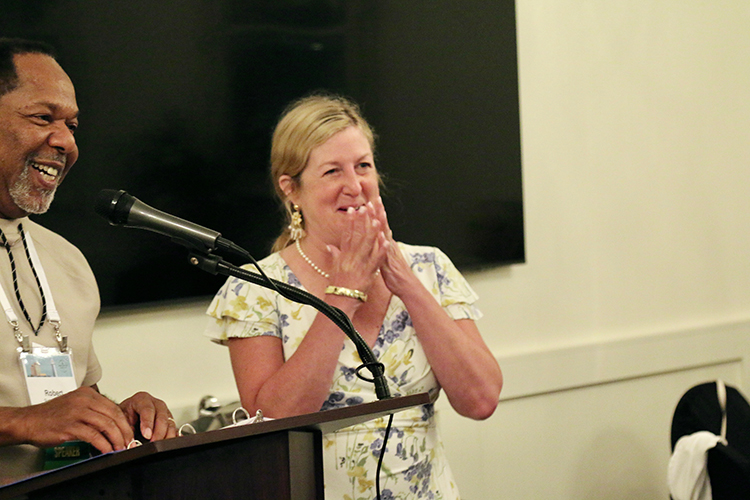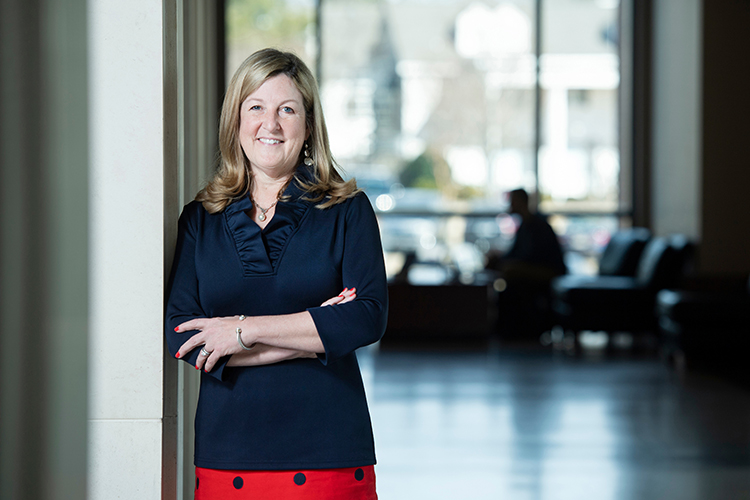
Susan Duncan (right), former dean of the University of Mississippi School of Law, reacts when Judge Robert Gibbs announces a scholarship fund established in her name at the school. Photo by Christina Steube/School of Law
Alumni, friends pay tribute to Susan Duncan by naming fund in her honor
A new scholarship in the University of Mississippi School of Law will serve as a perpetual tribute to the immediate past dean, Susan Duncan.
Alumni and friends of the school who were gathered at the 2023 meeting of the Mississippi Bar Convention surprised Duncan with the announcement of a scholarship fund established in her name.
“I am completely humbled and so honored,” said Duncan, who resigned as dean last year after serving six years but remains at Ole Miss as a law professor. “As a faculty and staff, we made great strides on behalf of the law school during my tenure.
“We had challenges, not the least of which was navigating the unique aspects of educating students during a pandemic, but we prevailed together.
The Dean Susan Duncan School of Law Scholarship Fund was started by Suzette Matthews, development officer for the school, who considers Duncan one of her closest friends.
“I love Susan and I’m going to miss her so much. I want her legacy as dean to live on forever,” said Matthews, who appealed to alumni and friends for help funding the scholarship.
Donors responded enthusiastically with contributions nearing the $50,000 needed to permanently endow the scholarship.
One of those donors is Jeff Hubbard, former president of the school’s alumni chapter. He said the tribute to Duncan is well deserved.
“Susan was exactly the type of dean that we needed to run our law school,” Hubbard said. “Specifically, she has great leadership qualities and she’s so approachable. People just genuinely like her and want to get on board with what she wants to do.”
Duncan is credited for increases in bar passage rates, enrollment, fundraising and career placement numbers. She’s also lauded for establishing Ole Miss Law School Cares, a program that allows alumni, faculty, staff or students who endure a traumatic event to receive help from members of the same community.
Ben Cooper, the school’s senior associate dean, served with Duncan all six years of her tenure.
“I got to work with her up close and talk with her on a daily basis,” Cooper said. “Primarily, what I respect and admire about her as a leader is that she prioritized serving the people she led. It was never about her own ego or self-aggrandizement, and Susan demonstrated that in the way that she worked hard in the best interest of the institution.
“We were in a good place when she started, but she took us to an even better place by really trying to get all of the units at the law school to function at their very best. She put the faculty and staff in a position to thrive with her support.”
Duncan joined the Ole Miss law school as dean in August 2017. She is the first female to serve as law dean not in an interim capacity.
Her teaching and research interests include lawyering skills, education law, family law and restorative practices, and leadership. Her scholarship has focused primarily on issues surrounding children, including the need for anti-bullying laws and laws protecting children from pornography on the internet.
She advocates for the use of restorative practices in schools, universities and in the workplace, and her most recent scholarship focuses on gender inequities in the legal academy.
On the national level, Duncan has served in leadership positions on several boards that focus on the development of new legal writing professors. She frequently presents on legal writing and education law topics, and Business First named her as one of the top 20 people to know in the field of education.
Duncan’s work has garnered recognition by many, including such honors as the 2016 Kentucky Bar President Special Service Award, the 2014 Distinguished Alumni Award from Louis Brandeis School of Law and the 2010 Louisville Bar Association Award for Distinguished Service.
Before joining the Ole Miss faculty, she served as interim dean at the University of Louisville Brandeis School of Law, where she started as an adjunct in 1997 and became a full-time faculty member in 2000. During her tenure, she served as chair of university’s Commission on the Status of Women and was a member of multiple university committees.
By Bill Dabney





